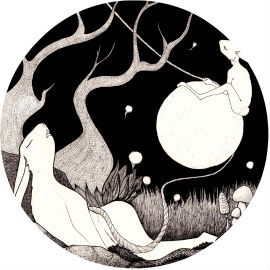I’ve been dreaming of covers for Dying in the First Person. The images in my head are of water, and of Samuel and Morgan (the twins around whom the novel swirls) as reflections of each other. So, of course, the images that come to me most often are Caravaggio’s Narcissus:
_edited.jpg)
Or this equally evocative image (again of Narcissus), by an unknown Dutch painter working in Rome during the mid-seventeenth century:
I find these images of young, beautiful men deeply entranced by their own reflections both disturbing and evocative. They remind me that, so often, these kinds of images are of girls, especially young girls. Caught in the act of self-consideration.
One of my favourite images of this theme featuring a young girl-child is by the children’s book illustrator John Bauer:

This 1913 illustration is of the Princess Tuvstarr, sitting by the dark waters of the pond in the middle of the forest. While Narcissus gazes at the surface of the water, admiring his own beauty, Tvustarr gazes into the water, through the surface, seeking her lost golden heart. The illustration relates particularly to the end of the story, which reads:
Tuvstarr sits, gazing down into the water, hoping for a glimpse of her lost heart. The princess is gone; there is just a little white flower with Tuvstarr’s name on the edge of the tarn. Now and then the moose returns, looking for her. He is the only one who recognises her now: Tuvstarr, the princess. Then she perhaps smiles–he is an old friend–but she will not follow him out of the woods. She cannot as long as the magic binds her. The magic is in the dark water. Far, far beneath the water lies her lost heart. (from sagan om älgtjuren Skutt och lilla prinsessan Tuvstarr, my own awkward translation!)
Today, I feel a little like Tuvstarr, on the edge of the dark pond. This book, with all its dark secrets and strange glimmers, is slowly floating to the surface.
I wonder, is every book an imperfect reflection of its author? A secret, sentence-formed self we can never really touch or know? An extruded self/other who both is, and is not, our golden heart?


No Comments